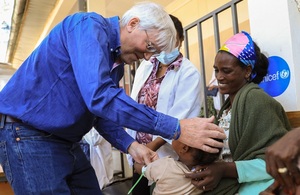UK pledges support for vulnerable communities in Ethiopia
The UK has announced life-saving assistance for hundred of thousands of Ethiopians at a pledging event in Geneva.

Deputy Foreign Secretary, Andrew Mitchell in Ethiopia.
- the UK seeks to galvanise the international community and has pledged vital life-saving assistance to help hundreds of thousands of Ethiopians, as their humanitarian crisis worsens
- new funding will support people facing the devastating impacts of climate change, conflict, disease outbreaks and economic challenges
- the Deputy Foreign Secretary visited Ethiopia and witnessed the crisis first-hand in Tigray in February
The UK will today [Tuesday 16 April] pledge humanitarian aid to provide lifesaving support for hundreds of thousands of Ethiopians, including over 435,000 children and mothers suffering from malnutrition and more than 230,000 needing access to emergency healthcare.
The new UK funding will treat the worst cases of acute malnutrition, covering critical gaps in nutrition supplies. It will also increase access to safe water and sanitation, while providing emergency cash and social protection to increase food security and resilience in vulnerable communities. The UK’s support will boost Ethiopians’ access to primary health care services including access to ambulance care, antenatal care, vaccinations, and ensuring women have a skilled healthcare worker when they give birth.
The Deputy Foreign Secretary Andrew Mitchell will announce the £100 million boost to UK funding at the UN Office for the Coordination of Humanitarian Affairs (OCHA) Ethiopia pledging conference in Geneva today where he will call on the international community to step up support to address the worsening situation.
Ethiopia faces one of the world’s largest humanitarian crises, with over 21 million people in need of assistance. Over 15 million people face food insecurity, and over 4 million people are internally displaced. Tigray and Amhara are some of the worst affected regions, with an El Niño-induced drought continuing to affect close to 5 million people.
Deputy Foreign Secretary Andrew Mitchell said:
The humanitarian crisis in Ethiopia is at a critical level. When I visited earlier this year I saw first-hand how conflict and drought are devastating communities – with women and young children being the hardest hit.
The UK is doing it all it can to ensure communities most in need across Ethiopia have access to nutrition, healthcare, water and sanitation. The international community must act now if we are to avoid the humanitarian crisis escalating further.
As vulnerable countries such as Ethiopia are impacted by more frequent and more severe drought and flooding, the UK is supporting them to adapt and build resilience for the long term. Funding will boost the climate resilience of communities and provide support for those displaced due to drought and extreme weather.
Today’s conference is co-hosted by the UK, the Government of Ethiopia, and the UN Office for the Coordination of Humanitarian Affairs (OCHA). The Deputy Foreign Secretary will call for the international community to continue its humanitarian efforts. He will also outline the importance of ensuring funding goes to those who need it the most and improving data analysis to increase the efficiency of the response.
Background
- the Deputy Foreign Secretary Andrew Mitchell visited Ethiopia in February, where the UK announced £100 million for Ending Preventable Deaths
- forecasts indicate that the number of critically food insecure people is projected to peak at 10.8 million between July and September. Malnutrition rates in several regions have significantly increased, surpassing critical thresholds
- the white paper and Global Food Security Summit (GFSS) and 2023 campaign set the stage for renewed UK leadership on humanitarian action and food security. This includes a strong focus on resilience building, prevention of malnutrition through the health system, and more climate resilient agriculture and food systems
- last year the UK doubled its humanitarian funding to Ethiopia from £42 million to £80 million in light of its increased needs. This year the UK will continue to scale up its work, providing £100 million for humanitarian assistance to avert a serious humanitarian crisis
- £30 million of this funding will be used to treat acute malnutrition for those in greatest need, covering critical gaps in nutrition supplies
- the remaining funding will target health, water and sanitation deficiencies as part of efforts to prevent and reduce malnutrition, while funding emergency cash and social protection to increase food security and resilience for vulnerable communities
Media enquiries
Email [email protected]
Telephone 020 7008 3100
Contact the FCDO Communication Team via email (monitored 24 hours a day) in the first instance, and we will respond as soon as possible.